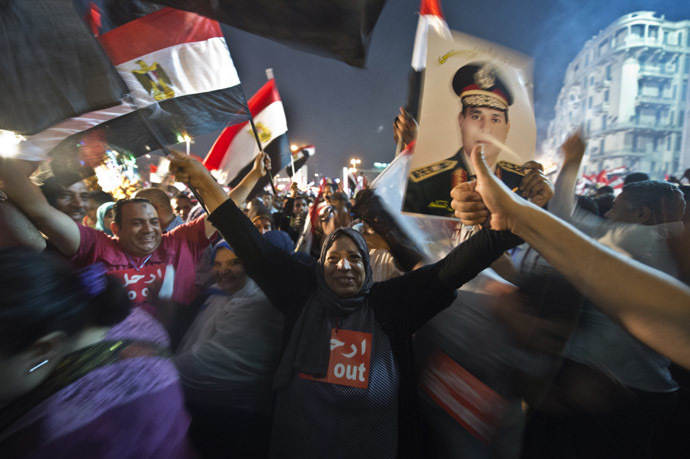‘Morsi ousted with US blessing’
From its inception the uprising against President Morsi was aided by the US, researcher and writer Soraya Sepahpour-Ulrich told RT. She argues that whoever succeeds the ousted Egyptian leader will likely be beholden to the forces that put him in power.

Morsi displacement is a military coup in the first place
RT:What do you think the future holds for Mohamed Morsi now?
Soraya Sepahpour-Ulrich: I don’t think Mohamed Morsi has any place to go to really. There might be a lot of jubilation that the military has removed him from office. President Morsi did make himself very unpopular not only inside Egypt but with his neighbors, the surrounding countries. But that being said, the implications are huge as he was democratically elected. And for the army to step in and remove him from office is a military coup and it is very hard for me to believe that the military would have taken this step without the blessing of the United States.
I know that the Americans said, President Obama said, that they
would review aid to Egypt. But [US Secretary of Defense] Chuck
Hagel had been on the phone with Egypt for two or three days.
Egypt basically owes its military, owes its existence to the
United States of America. This is not a step they would take
without their blessings.
Mohamed Morsi may be out now, but his followers will not be and we’ll only see an escalation of clashes, which is very unfortunate for the Egyptian people.
‘People rallying against poverty – and Morsi’
RT:You talk about the support the Egyptian military
got from the US. But live video from Tahrir Square suggests that
there are people out there, a significant if not a majority of
the Egyptian population who also want Morsi out of power.
SSU: I’m not arguing with that, I’m talking about a military that gets its support from the United States. You have to understand that a lot of people that are on Tahrir Square right now, many of them are not supporters of Morsi. The military actually put tanks against Morsi’s supporters and was very quick to arrest them.
There are people on the streets. A lot of them may be opposed to Morsi because of the laws that he wanted to establish, but a lot of it is also the economy. The [Egyptian] economy is very poor, these are very poor people. A lot of them are out there maybe protesting the fact that President Morsi was not able to improve the economic conditions better over the last year he had in office.

‘Egyptian army defends US-Israeli interests’
Again, for the military to have stepped in and removed him from power, and especially for General [Chief of the Egyptian Armed Forces, Abdul Fatah Khalil] Al-Sisi, who was instrumental in blocking and enabling the Israelis to kill the Gazans, for them rejoicing over that is just mindboggling. The [Egyptian] military is an instrument of the United States of America, and the billions [of dollars] in support it has gotten for years now goes towards maintaining peace with Israel, not to serve Egyptian people.
Very soon the Egyptian people will wake up and realize that they are perhaps cheering the wrong faction.
American protégé ElBaradei most likely to replace Morsi
RT:The military, having pushed Morsi out of power now, do you think they have a plan who will lead the country next?
SSU: Again, America has invested a lot of time and money into this. Ever since 2007, America knew that former President Mubarak was dying of cancer. There was even a New York Times article in 2007 talking about who would be his replacement. Since 2008, they would have young Egyptians coming to America, go to the State Department, meet at the time Condoleezza Rice and others, and learn how to use modern technology to start an uprising in Egypt.
So this uprising from the very start was aided by the United States and one of the favorite horses in the race has been and continues to be [Nobel Peace Prize winner and opposition leader] Mohammed ElBaradei. He is the one who actually met with the military to remove Morsi.
Interestingly enough, ElBaradei is a member of the International Crisis Group, which is funded by George Soros and also the Carnegie Endowment and Ford Foundation, which during the Cold War was a conduit for CIA money. Although some have said that Mohamed ElBaradei [when he served as Director General of the International Atomic Energy Agency (IAEA)] never pushed hard enough to say that Iran was developing a nuclear program and Israel might have had issues with that, he is in fact a favorite [to succeed Morsi] and he is coming up very prominently right now.

‘Next Egyptian president risks becoming a puppet’
RT:Do you think this is bad for the country right now? Mohammed ElBaradei is internationally respected figure, widely regarded as moderate and pro-democratic force for Egypt.
SSU: ElBaradei absolutely is. But it is bad for any country when somebody is helped from the outside – from forces without – to bring this person to power.
Then that person will automatically turn into a puppet. Their concern will not be for ‘what is good for the country’, their concern is their ambition, and that is always dangerous, whether they are moderate or fundamentalist – it does not matter. It should be an Egyptian decision.
RT:If he is elected into office – do you think that there will be a legitimate popular support for him?
SSU: I think that the people will have to decide. But ultimately, should he be elected into office, which is very likely, one has to remember where he comes from and how he got to become so prominent and whose support he has.
A lot of times it happens in every country and we’re not aware of the forces behind a figurehead or a given politician. And once that plays out, you might realize that it is a bit too late to change the course. But let’s hope for the best.
‘Chaos will prevail’
I don’t think that the followers of President Morsi will sit back and take this very quietly.
My hope and my wish for Egypt is to see a very peaceful process from here on. But I doubt that will be the case. I think chaos will prevail.
RT:Why do you say chaos will prevail?
SSU: The Muslim Brotherhood followers, the people that put Morsi into power, they feel disenfranchised. In fact, all though one does not want to see this conflict at all, they are the ones who have more right to backing the democratically elected president than anyone else.
If they feel they don’t really count anymore, that their votes
and voices don’t count, they are going to show reaction, I think
it is normal.
The statements, views and opinions expressed in this column are solely those of the author and do not necessarily represent those of RT.
The statements, views and opinions expressed in this column are solely those of the author and do not necessarily represent those of RT.












